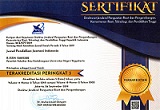Evaluasi Praktik Kependidikan (PK) Mahasiswa Prodi PJKR di Masa Pandemi Covid-19
Downloads
Praktik Kependidikan (PK) merupakan program wajib tempuh bagi mahasiswa prodi kependidikan untuk menyiapkan diri menjadi guru profesional, namun PK pada dua tahun belakangan tidak dapat berjalan sebagaimana mestinya akibat adanya pandemi. Tujuan dari penelitian ini adalah untuk mengevaluasi penyelenggaraan PK Mahasiswa Program Studi Pendidikan Jasmani Kesehatan dan Rekreasi (PJKR) di Masa Pandemi Covid. Langkah-langkah teknik pengumpulan data meliputi usaha membatasi penelitian, mengumpulkan informasi melalui observasi, wawancara, baik yang terstruktur maupun tidak. Penelitian menggunakan metode CIPP. Context: 1) Latar Belakang Program mendapatkan nilai rata-rata 3,44 kategori baik; 2) Pembinaan mendapatkan nilai rata-rata 3,53 kategori baik; dan 3) Tujuan Program Pembinaan mendapatkan nilai rata-rata 3,61 kategori Baik. Input: 1) Kualifikasi Guru pamong dengan nilai rata-rata 3,63 kategori Baik, 2) Mahasiswa PK nilai rata-rata 3,48 kategori Baik, 3) Sarana dan Prasarana nilai rata-rata 3,59 kategori Baik, 4) Dukungan dari orangtua nilai rata-rata 3,72 kategori Baik. Sedangkan pada indikator 5) Pendanaan nilai rata-rata 3,24 kategori Cukup Baik. Process: 1) Pelaksanaan Program Sekolah nilai rata-rata 3,47 kategori Baik, dan 2) Monitoring nilai rata-rata 3,38 dengan kategori Baik. Product: Indikator Prestasi mendapatkan skor rata-rata nilai 1,67 kategori Tidak Baik.
Educational Practice (PK) is a mandatory program for students of education study programs to prepare themselves to become professional teachers, but PK in the last two years has not been able to run properly due to the pandemic. The purpose of this study was to evaluate the implementation of Educational Practices (EP) for Students of the Physical Education Health and Recreation Study Program (PEHR) during the Covid Pandemic Period. The steps of data collection techniques include efforts to limit research, collect information through observation, interviews, both structured and unstructured. The study used the CIPP method. Context: 1) Program Background got an average score of 3.44; 2) Coaching gets an average score of 3.53; and 3) The objective of the Coaching Program is to get an average score of 3.61, all three of which are in the Good category. Inputs: 1) Qualifications of Civil Service Teachers with an average score of 3.63; 2) EP students have an average score of 3.48; 3) Facilities and infrastructure with an average score of 3.59; 4) Support from parents with an average score of 3.72, all four of them were in a Good category. Meanwhile, indicator 5) Funding has an average value of 3.24 in the Fairly Good category. Process: 1) Implementation of School Programs with an average score of 3.47 in the Good category, and 2) Monitoring an average score of 3.38 in the Good category. Product: Achievement Indicators get an average score of 1.67 in the Bad category.
Downloads
Asmani, J, A,. (2012). Kiat mengembangkan bakat anak di sekolah. Yogyakarta. Diva Press.
Azwar, Syaifuddin. (2008). Reliabilitas dan validitas. Yogyakarta: Pustaka Pelajar.
Boyle & Phelps. (2010). Pathways to teaching: a curriculum innovation enhancing recognition of students' career aspirations and expectations: redesigning curriculum to acknowledge diversity. The International Journal of Learning. Volume 17, Number 2
Cresswell, Jhon W. (2016). Research Design: Pendekatan metode kualitatif, kuantitatif, dan campuran. Yogyakarta: Pustaka Pelajar
Daryanto. (2014). Pendekatan pembelajaran saintifik. Bandung: Rineka Cipta.
Donald, B. Y., Lyn, M. S., Rodney, K. H., & Flora, A. C. (2011). The program evaluation standars. United State of America: Sage pubplications.
Hastuti, Tri Ani. (2020). Kesiapan mahasiswa pendidikan jasmani kesehatan dan rekreasi melaksanakan praktik kependidikan. Jurnal Pendidikan Jasmani Indonesia. Retrieved April 7, 2022, from https://journal.uny.ac.id/index.php/jpji/article/view/35506/pdf
Kaloka, Pasca Tri., Sridadi. (2015). Evaluasi butir soal ulangan akhir semester gasal mata pelajaran pendidikan jasmani olahraga dan kesehatan pada kelas khusus bakat istimewa olahraga (bio) di SMA Negeri 4 Yogyakarta. Jurnal Pendidikan Jasmani Indonesia.
Maksum, Ali. (2012). Metodologi penelitian dalam olahraga edisi kedua. Yogyakarta: Pustaka Pelajar
Ngatman. (2013). Evaluasi pencapaian standar kompetensi mahasiswa ppl program ppkhb penjas uny tahun 2011. Jurnal Pendidikan Jasmani Indonesia. Retrieved April 7, 2022, from https://journal.uny.ac.id/index.php/jpji/article/view/3060/2551
Pramesti, Dinar Argawi. (2020). Evaluasi pelaksanaan dan pengukuran capaian hasil pembelajaran jarak jauh pada jenjang sekolah dasar selama pandemi corona di desa gondang kabupaten sragen. Laporan UMS.
Sridadi. (2020). Evaluasi butir soal ulangan akhir semester gasal mata pelajaran pendidikan jasmani olahraga dan kesehatan pada kelas khusus bakat istimewa olahraga (bio) di sma negeri 4 yogyakarta. Jurnal Pendidikan Jasmani Indonesia
Stufflebeam, D, L. & Shinkfield, A, J. (2009), Evaluation theory, models, and applications, san francisco: A Wiley Imprint. Journal of Multi Disciplinary Evaluation. Volume 6, Number 11. ISSN 1556-8180.
Sugiyono. (2015). Metode penelitian dan pengembangan pendekatan kualitatif, kuantitatif, dan r&d, Bandung: Alfabeta.
Suhaidin, Armin. (2015). Valuasi program pembelajaran pendidikan jasmani di pondok pesantren mu'alimin muhamadiya h daerah istimewa yogyakarta. Jurnal Pendidikan Jasmani Indonesia. Retrieved April 7, 2022, from https://journal.uny.ac.id/index.php/jpji/article/view/8170/6841
Sukardi. (2015). Metodologi penelitian. Yogyakarta: Bumi Aksara

Jurnal Pendidikan Jasmani Indonesia is licensed under a Creative Commons Attribution-ShareAlike 4.0 International License.
Based on a work at https://journal.uny.ac.id/index.php/jpji.











